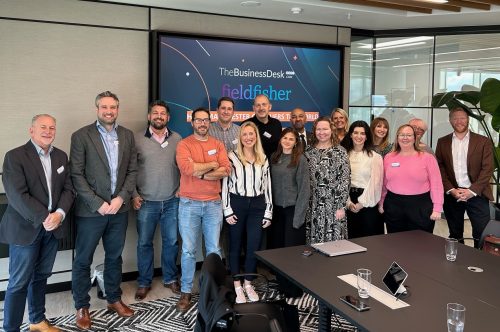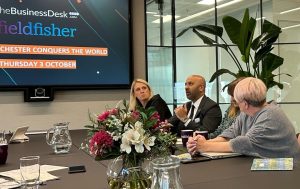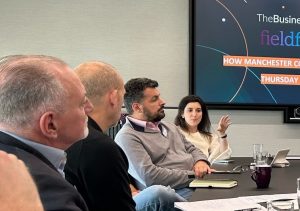Manchester’s Moment: How the city is competing on a global stage


Key participants included representatives from Swiss Re, Comwrap Reply Group, Alvarez & Marsal, Marsden Strategy, and Hitachi Solutions.
Deborah Walker from Midas started with an update on the work she has on. She emphasised Manchester’s competitive landscape in attracting foreign direct investment and how that is coupled with its ambitious Net Zero target of 2038, an important consideration for businesses looking to locate outside their home country.
Concerns were also raised about transport infrastructure, national government policies affecting the region’s successful private equity industry, and the need for better education and skills alignment.
The whole discussion underscored Manchester’s success at communicating that unique blend of innovation, collaboration, and social value, but also had plenty of challenges aired.
A city of reinvention
Manchester has long been the beating heart of the North, a city that has reinvented itself time and time again. From its industrial roots to its current status as a thriving hub of innovation, culture, and enterprise, there’s no question Manchester is a city on the rise. And nowhere is this more evident than in its ability to attract foreign direct investment (FDI) from around the globe.
Our carefully convened group of business leaders, placemakers and industry experts gathered at the offices of law firm Fieldfisher in the heart of Manchester to discuss the city’s FDI success story.
“Manchester is now competing on a global stage, not just within the UK,” explained Deborah Walker, head of the financial and professional business services team at Midas, Greater Manchester’s inward investment agency. “We’re no longer just leveraging the brand of London and saying ‘come a bit further north.’ We’re actually leveraging Manchester’s own brand on a global stage.”
And what a brand it is. From its rich cultural heritage to its thriving tech and innovation ecosystem, Manchester has carved out a reputation as a city that “does things differently”, to quote the oft mis-sourced cliché.
A sense of community
“There’s a great sense of community and collaboration here,” says Helen McHugh, founder and director of Marsden Strategy, and a former executive with London’s equivalent of Midas. “When I moved up from London, I was amazed at how quickly I was able to make connections and get things done. It’s a smaller ecosystem, but you can make a real difference quite quickly.”

Helen McHugh and Amer Gaffar
This collaborative spirit is a key part of Manchester’s appeal, particularly for international businesses looking to establish a foothold in the UK. “The ability to work well together in a community, to share ideas and figure out problems together rather than compete, is a real differentiator,” says Ben Barton, who heads up the Manchester office of Swiss Re.
Timur Asar, part of the team behind the Italian IT company Comwrap Reply Group’s new northern hub in Manchester, agrees. “There’s that community, that culture, that is what, for me, sells Manchester against everything else,” he says.
Heather Statham, from the German-headquartered digital transformation company GFT, also highlights the importance of tapping into the local talent pool. “We have quite an extensive partner ecosystem, and that’s one of the reasons we came up to Manchester, was to really tap into the local businesses here,” she says.
But it’s not just the city’s collaborative nature that is drawing in global investment. Manchester’s thriving private equity and mid-market corporate finance community is also a major draw. “Manchester has a really thriving private equity market community,” says Charlie Morris, a director in corporate finance at Alvarez & Marsal. “A lot of the work we do is on the sales side, helping predominantly businesses receive investment from private equity or even selling outright.”
David Bowcock, managing partner of Fieldfisher’s Manchester office, goes even further, arguing that Manchester’s deals market is on par with some of the biggest cities in Europe. “If you actually take London out of the equation, Manchester is on a par with, I would say, in corporate finance terms, pretty much all of the European cities,” he says.
This sentiment is echoed by Victoria Price, who leads Alvarez & Marsal’s private capital team across the UK. “Manchester is on a par with significant global cities,” she says. “We’re a bit of the sleeping giant in Europe.”
Challenges that come with success
But Manchester’s success is not without its challenges. One of the key issues raised by the roundtable participants is the need to ensure that the city’s growth benefits all of its residents, particularly those in areas of high social deprivation.
“The thing that keeps me awake at night is making sure that everything we’re doing means that those kids in Harpurhey don’t come here and say, ‘What’s all this?'” says Deborah Walker. “That they know that organizations like Alvarez & Marsal and Swiss Re are here, and that there are jobs available for them, and that they know how to access them.”

Alex Watson
Alex Watson, a partner in the employment, pensions and immigration team at Fieldfisher’s Manchester office, also emphasised the importance of the city’s inclusive agenda: “I think we weaken ourselves if we don’t bring everybody with us. And it is a difficult blend. But if we end up with thriving parts of a city and leaving great chunks of it behind, we’re starting to create things that we look at in the Third World and look down our nose at. We’ve been very lucky. We did a lot with Manchester Youth Zone over the last two years. It’s been a real eye opener for a lot of us, fascinating to work with them.”
Amer Gaffar, director of the Hydrogen Fuel Cell Research Centre at Manchester Metropolitan University, agrees, highlighting the importance of addressing the city’s skills agenda and linking that to job opportunities across the city.
“If you take the amount of infrastructure projects that get announced, there’s no skills thought that really goes into those big announcements,” he says. “We’re not counting properly for local labour market needs.”
Part of his role, he explained, has been to accompany business leaders and the Mayor, Andy Burnham, on trips overseas, including one to Japan which forged a strong investment partnership with industrial giant Panasonic.

Carl Gallagher, director of pre-sales at Hitachi Solutions Europe, discussed the company’s decision to establish a presence in Manchester and the city’s appeal as a tech hub:
“We’re a fairly new resident of Manchester. I think we’ve got around 15% of our UK workforce now are within commutable distance of Manchester. So it no longer makes sense for us to drag everybody down into London for a meeting. So we’ve got some big ambitions for the area. We want to grow our presence in this area so that we can offer our people a base, but also look to kind of expand to the customers that we’re working with in the region as well.”

Lori Hoinkes
Lori Hoinkes, the Chief Executive of Manchester Central, the city’s premier exhibition venue, was struck by the unique vibe and collaborative nature of Manchester upon taking on her new role.
“One of the things that I first noticed was that our portfolio of events that we host, there’s about 150 a year, has grown really organically,” Hoinkes said. “But I’m actually keen to really understand what are our sector strengths, and what really should we be doing with that finite resource? And how do we make sure that we not only are successful as a business, but that we’re driving the maximum amount of economic impact to the city as well?”
Hoinkes was particularly impressed by the city’s welcoming and supportive atmosphere for newcomers. “I think that the fact that Manchester and Greater Manchester is a smaller ecosystem, it’s much smaller than London’s, and you can and that’s one of the great benefits,” she explained. “You can make a difference here really quite quickly with with quite a lot less effort.”
This collaborative spirit is a key part of Manchester’s appeal, according to Hoinkes. “The fact that, you know, that person might run one to five events a year, but we do 150 and so we should really be challenging them, and that’s one of the areas where I’ve said we really need to challenge them to see, you know, are they connecting to the local community in the right way. Are they? Are they connecting with the different academic institutions? Are they reaching out to the local businesses?”
Hoinkes is eager to leverage Manchester Central’s position to better connect the city’s various stakeholders and drive greater economic impact. “I want to make sure that, you know, the people of Manchester really benefit from what goes on at Manchester Central,” she said. “And it can be really, you can get just really busy trying to just deliver and do what you’re doing, and not not put the effort into to build those bridges and connections and understand how, how the wider ecosystem works.”








